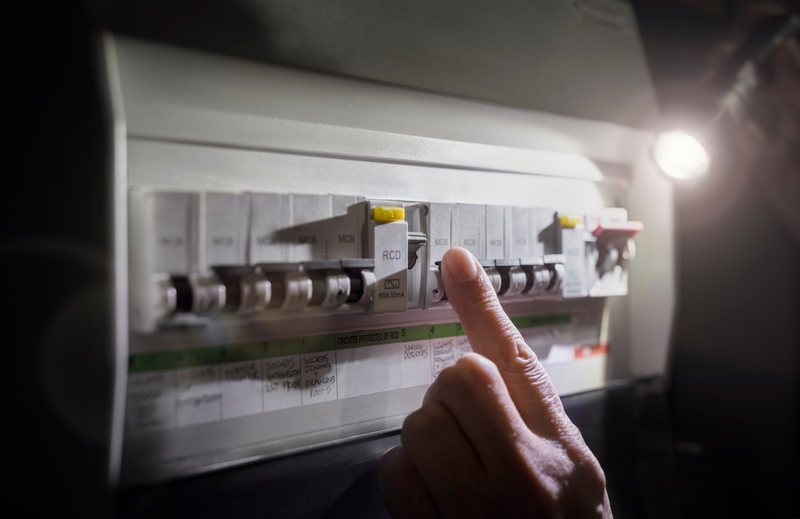There are two types of household crisis. The first is when your Wi-Fi goes down and the children behave like civilisation itself has collapsed. The second is when something genuinely goes wrong — water spraying where it shouldn’t, alarms bleeping, or the house plunged into darkness.
And here’s the thing: in these moments, everybody looks to Dad. You can hang pictures and paint walls all you like, but it’s knowing how to keep a burst pipe from flooding the kitchen at 10pm that really earns your stripes. So here’s a practical guide to the household emergencies every dad should be able to handle, with just enough humour to keep your sanity intact.
Shut Off The Mains Water
If you only remember one thing from this list, make it this. When a pipe bursts or the toilet won’t stop filling, you don’t want to be frantically Googling “where is stopcock?” while your hallway becomes a paddling pool.
Find your stopcock now — usually under the kitchen sink, in the garage, or sometimes in the cellar — and practice turning it. Clockwise is off. Then show the rest of the family where it is, because this one’s too important to be “Dad only.”
Knowing you can cut the water off in seconds gives you instant control in a crisis.
Know How To Turn The Gas Off
Gas leaks are rare, but you don’t want to be caught guessing if you ever smell that telltale eggy whiff. The gas shut-off valve is usually near the meter. It may have a handle, it may not. If it doesn’t you will need a wrench, so maybe have one on standby. Learn how to turn it 90 degrees to stop the flow, then open windows, get everyone out, and call the emergency number.
Definitely not a job for DIY heroics — but stopping the gas before you leave? That’s a vital dad skill. It could mean the difference between a close call and a very serious situation, so treat it with the respect it deserves.
Reset The Fuse Box Without Panicking

When the lights go out and the kids start acting like extras in a horror film, knowing where the fuse box lives is half the battle. Find it now, and learn how to reset a tripped switch.
Pro tip: if it keeps tripping, don’t just keep flicking it back — unplug the dodgy toaster or lamp first. Something is causing it to trip, sp find the cause, otherwise you’re basically in a looped sitcom scene.
Being calm and confident here not only restores the lights but reassures everyone else that you’ve got things under control.
Stop The Toilet From Overflowing
Few moments inspire true panic like watching the water level in the loo rise instead of fall.
Here’s what to do: if you have access, lift the lid off the cistern and push the float down to stop more water coming in. If it’s still threatening to spill over or you can’t get to the cistern, turn off the toilet’s isolation valve (usually a little silver tap on the pipe). Then you can sort the blockage at your own pace — or call a plumber with dignity intact.
Knowing this trick stops you from starring in your own watery slapstick routine.
Bleed And Balance The Radiators
Not strictly an “emergency,” unless you count the family complaints when the living room is freezing while the hallway is tropical. But knowing how to bleed a radiator (quick hiss of air, little dribble of water, done) is basic dad magic.
If you want extra credit, learn how to balance the system so every room warms up evenly — it’s like giving the house central heating manners.
Your reward is fewer arguments about which room is “too cold” and a system that actually runs more efficiently.
Handle Frozen Or Burst Pipes

When the temperature drops, pipes can freeze. Signs include taps that suddenly stop running or pipes covered in frost. If you catch it early, thaw gently with a hot water bottle or warm towel — never with a blowtorch unless you want to feature on the evening news.
If it’s already burst, turn off the mains water straight away (remember that stopcock!) and drain the system by running the taps until empty.
It’s messy, but getting ahead of it can save carpets, ceilings, and your sanity.
Fire Safety Basics
You don’t need to be a firefighter, but you do need to know how to use a fire blanket or extinguisher. Blanket for kitchen pan fires, extinguisher for small contained ones. And here’s the big one: if in doubt, get out.
Make sure the kids know the escape plan and that smoke and carbon monoxide alarms are fitted and working. Changing the batteries is the least glamorous job going, but it’s one of the most important.
When you’re the one doing it, you’re quietly keeping the whole family safe.
Prepare For Power Cuts
Storm season hits, the lights flicker, and before you know it you’re sitting in darkness with only the dog’s glowing eyes for company.
Have torches (with batteries!) in known places — not buried in the shed under last summer’s paddling pool. Candles are fine, but never leave them unattended. And if your trip switch has gone, know how to reset it before the family stages a coup.
Keeping a few snacks, blankets, and even a board game handy turns a power cut from a crisis into an impromptu family adventure.
Turn Things Off Properly

The boiler making an ominous clanking? The oven smoking like a bonfire? Sometimes the right move is simply to switch things off at the power source and call in the pros.
Knowing where the isolator switches are — for boiler, oven, hob — means you can make things safe in seconds. That buys you peace of mind until someone qualified turns up.
It also makes you look calm and capable when everyone else is panicking, which is half the dad job done right there.
Resetting the Router
Okay, not life or death, but let’s be real: in most households, “the internet’s down” is treated as an emergency.
Know where the router is, how to reset it, and what those blinking lights mean. Because when the Wi-Fi drops during a teenager’s online gaming session, you’ll face a crisis of diplomacy, not plumbing.
It’s not glamorous, but in today’s world keeping the internet alive is right up there with keeping the heating on.
Understand the Basics
You don’t need to be a DIY expert or a budding tradesman to handle these moments. You just need to know where things are, how to turn them off, and when to call in help. Get a grip of the basics and you can prevent or at least limit the destruction and distress caused by household emergencies.
Most of all, you need to keep calm while everyone else is flapping — which, let’s face it, is half the dad job description anyway.
So take a Saturday morning, find the stopcock, locate the fuse box, and make sure the torches work. Because when disaster does strike, being able to spring into action and sort it — or at least stop it getting worse — is what makes you the household hero.
Even if nobody thanks you at the time.

